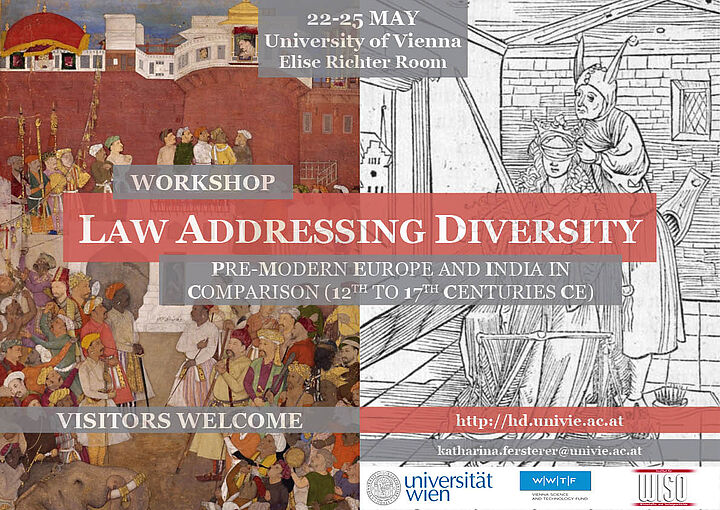Samstag, 24. Mai 2014, 09:30 - 18:00 iCal
Law Addressing Diversity
Pre-Modern Europe and India in Comparison (12th to 17th Centuries CE), 22-25 May
Elise-Richter-Saal im Hauptgebäude der Universität Wien
Universitätsring 1, 1010 Wien
Tagung, Konferenz, Kongress, Symposium
Weitere Termine
Donnerstag, 22. Mai 2014, 19:00 - 22:00
Freitag, 23. Mai 2014, 09:00 - 18:00
Sonntag, 25. Mai 2014, 10:00 - 16:00
May 22nd: 19.00 "Getting Together" in the Arcades of the Central Courtyard (between staircases 7 and 9)
May 23rd: 09.00 - 18.00 Elise Richter Room
May 24th: 09.30 - 18.00 Elise Richter Room
May 25th: 10.00 - 16.00 "Diversity in Vienna" (city tour by foot and bus)
The phrase “Diversity in unity – unity in diversity” has been quoted frequently in recent years to characterize both Europe’s and India’s pre-modern societies. The consequences of the predicament that this phrase attempts to describe were as diverse as the people involved and ranged from acculturation, entanglement and co-existence to segregation, expulsion and elimination. Although each encounter entailed a particular outcome, persistent confrontation forced people to concern themselves with general questions related to the Other’s presence: How to distinguish between us and them, how to treat the Other, how to draw boundaries or how to converge divergent groups. Medieval and early modern written sources are littered with remarks on such questions. The great amount of attention historical research has in recent years paid to the perception of and dealings with the Other is therefore quite justified also for the medieval to early modern period.
In our workshop, we intend to apply a distinctive perspective by putting the focus on legal experts and their texts. Neither in Europe nor in India were those with legal expertise a coherent group with a uniform background, formation or job description. Different forms of legislation, legal practice, court procedure, legal education, profession, and law enforcement existed in both regions throughout the period from 1100 to 1700. Instead of equality before the law, a legal pluralism was practiced, where specific legal traditions and modes of jurisdiction were assigned to specific social groups. Legal experts, therefore, had to operate within a matrix of legal cultures that matched societal diversity. Law and legal practice on the one hand mirrored societal complexity, and on the other were means to categorize and shape complex societies.
We plan to gather between a dozen and sixteen studies from pre-modern Europe and India that investigate how legal experts or practitioners actively tried to cope with diversity. We would like to proceed on the basis of questions such as: how was societal complexity perceived and categorized in legal texts, and which linguistic and social terms were used? What kind of reasons, legitimation and motives were named explicitly or applied tacitly? How can the impact of legal measures be assessed? How did legal practitioners evaluate their own role and position within their diverse societies and how did they perceive their ideological links across state boundaries and across the ages? To what extent was law a means of inventing or dismantling social identities and boundaries? Did people shop for justice by trying to tap into the various legal systems available? Was there a general tendency towards convergence or towards divergence, or were there opposing trends in different contexts such as Empire, regional state or city state, or on different levels of society? To sum up: How did legal practice cope with the challenge of cultural difference?
The workshop aims to bring together a group of historians and legal historians to discuss specific topics or phenomena from a European as well as from an Indian perspective. In each panel we would like to pair one paper on the Indian context with one on the European context. We hope that the speakers will point out some comparanda and that the ensuing discussion will generate a “comparative surplus” that transcends the sum of the parts. This choice of format means that we do not strive for a coherent history of law addressing diversity, but instead hope to highlight certain junctions where law and diversity met, clashed, merged, influenced or hindered each other.
Zur Webseite der Veranstaltung
Veranstalter
Institut für Wirtschafts- und Sozialgeschichte der Universität Wien
Kontakt
Katharina Fersterer
Institut für Wirtschafts- und Sozialgeschichte
+43 1 4277 - 41316
katharina.fersterer@univie.ac.at
Erstellt am Montag, 19. Mai 2014, 16:24
Letzte Änderung am Mittwoch, 21. Mai 2014, 09:44

